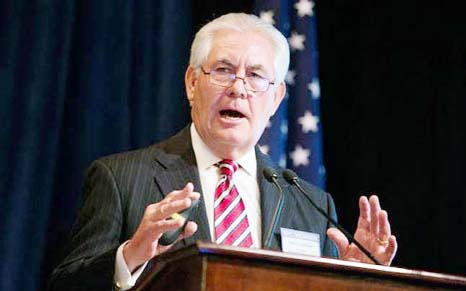
AP, Lucca :
Foreign ministers from the Group of Seven industrialized nations are gathering Monday for a meeting given urgency by the chemical attack in Syria and the U.S. military response, with participants aiming to pressure Russia to end its support for President Bashar Assad.
Last week’s nerve gas attack in the rebel-held town of Khan Sheikhoun, which killed more than 80 people, stirred President Donald Trump to strike for the first time at Assad’s forces. U.S. warships fired 59 cruise missiles at the Syrian air base from which the U.S. believes the attack was launched.
Italian Foreign Minister Angelino Alfano, who is hosting the meeting, said Europe’s broad support for the U.S. military strikes had contributed to a “renewed harmony” between the United States and its partners ahead of the first meeting of G-7 foreign ministers since Donald Trump took office in January.
“We need to remember that not 10 years ago, but 100 or 120 days ago, the concern in Europe was that the United States and the EU were moving apart,” Alfano told Sky TG24 Sunday. “I welcome this renewed harmony.”
Officials are hoping that this can be leveraged to bring a new diplomatic push to end the 6-year-old civil war in Syria.
The meeting in the Tuscan walled city of Lucca brings together U.S. Secretary of State Rex Tillerson, British Foreign Secretary Boris Johnson and Japanese Foreign Minister Fumio Kishida, along with other G-7 foreign ministers, at a moment when the United States is sending a Navy carrier strike group toward the Korean Peninsula to provide a physical presence following North Korea’s persistent ballistic missile tests.
The meeting also comes amid an ongoing terror threat that was underscored by the deadly Palm Sunday bombing of Coptic churches in Egypt claimed by the Islamic State terror group, and another truck attack on European soil, this time in Stockholm, on Friday.
The United States is fighting Islamic State group militants in Syria but had previously avoided striking government forces, largely out of concern about being pulled into a military conflict with Russia.
The chemical attack has sent a new chill through relations between the West and Moscow, which denies Syrian forces used chemical weapons.
Alfano was cautious on the question of whether to push Assad out, saying that decision should be up to the Syrians.
“I have to say, the Libya experiment did not go well. We are still paying the price,” Alfano said, referring to the lawlessness that has ensued since the killing of longtime dictator Moammar Gadhafi and the subsequent flow of migrants to Europe via Italy.
Russia was kicked out of the club of industrialized nations, formerly the G-8, after its 2014 annexation of Ukraine’s Crimea region and assistance for pro-Russian separatists in eastern Ukraine.
Foreign ministers from the Group of Seven industrialized nations are gathering Monday for a meeting given urgency by the chemical attack in Syria and the U.S. military response, with participants aiming to pressure Russia to end its support for President Bashar Assad.
Last week’s nerve gas attack in the rebel-held town of Khan Sheikhoun, which killed more than 80 people, stirred President Donald Trump to strike for the first time at Assad’s forces. U.S. warships fired 59 cruise missiles at the Syrian air base from which the U.S. believes the attack was launched.
Italian Foreign Minister Angelino Alfano, who is hosting the meeting, said Europe’s broad support for the U.S. military strikes had contributed to a “renewed harmony” between the United States and its partners ahead of the first meeting of G-7 foreign ministers since Donald Trump took office in January.
“We need to remember that not 10 years ago, but 100 or 120 days ago, the concern in Europe was that the United States and the EU were moving apart,” Alfano told Sky TG24 Sunday. “I welcome this renewed harmony.”
Officials are hoping that this can be leveraged to bring a new diplomatic push to end the 6-year-old civil war in Syria.
The meeting in the Tuscan walled city of Lucca brings together U.S. Secretary of State Rex Tillerson, British Foreign Secretary Boris Johnson and Japanese Foreign Minister Fumio Kishida, along with other G-7 foreign ministers, at a moment when the United States is sending a Navy carrier strike group toward the Korean Peninsula to provide a physical presence following North Korea’s persistent ballistic missile tests.
The meeting also comes amid an ongoing terror threat that was underscored by the deadly Palm Sunday bombing of Coptic churches in Egypt claimed by the Islamic State terror group, and another truck attack on European soil, this time in Stockholm, on Friday.
The United States is fighting Islamic State group militants in Syria but had previously avoided striking government forces, largely out of concern about being pulled into a military conflict with Russia.
The chemical attack has sent a new chill through relations between the West and Moscow, which denies Syrian forces used chemical weapons.
Alfano was cautious on the question of whether to push Assad out, saying that decision should be up to the Syrians.
“I have to say, the Libya experiment did not go well. We are still paying the price,” Alfano said, referring to the lawlessness that has ensued since the killing of longtime dictator Moammar Gadhafi and the subsequent flow of migrants to Europe via Italy.
Russia was kicked out of the club of industrialized nations, formerly the G-8, after its 2014 annexation of Ukraine’s Crimea region and assistance for pro-Russian separatists in eastern Ukraine.

